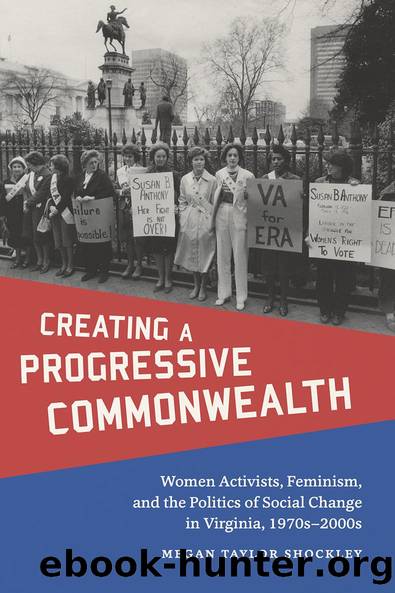Creating a Progressive Commonwealth by Megan Taylor Shockley

Author:Megan Taylor Shockley [Shockley, Megan Taylor]
Language: eng
Format: epub
ISBN: 9780807169360
Barnesnoble:
Publisher: Louisiana State University Press
Published: 2018-12-05T00:00:00+00:00
Reforming Sexual-Assault Laws
In Virginia, as in other places, the fact that women fought against poorly designed rape laws caused judges to be hesitant to convict accused attackers and made women fear even coming forward with charges. In 1973, graduate students Wendy Wilson and Kathleen McKinnon, students in Virginia Commonwealth Universityâs School of Social Work posted a flyer titled, âShould Victims Pay the Price for Unjust Laws?â as part of an effort to organize students to lobby for a revision of the criminal code. They suggested revising the law to provide degrees of sexual-assault felony; define rape as âintrusion, however slight,â of anyoneâs body by any means; raise the age of consent; and disallow âEvidence of victimâs prior behaviorâ into testimony. In addition, they called for an addition of marital rape to the code if the husband and wife were legally separated or divorced.40 They explained in a letter to Meg Williams, a Virginia Commonwealth University student and lobbyist for the Virginia Womenâs Political Caucus (VWPC), judges were reluctant to pursue rape convictions because they didnât want to commit the perpetrators to life in prison. This was the law of Virginia at the time, and moreover, victims did not want to see their pasts dragged out by the criminal defense team, which explained their desire to see different degrees of sexual assault named.41 For those unfamiliar with rape law codes, it may seem unusual to try to push for more lenient sentencing. However, as Mary Ann Bergeron remembered, many believed mandated life sentences were âone of the problems with juries convicting.â She said there were legislative efforts related to reduced sentencing âthat would make it easier for a case to come to trial and actually have a hope of conviction.â42
Students at Virginia Commonwealth University were not the only ones discussing necessary changes. In fact, a representative from the Fairfax County Board of Supervisors suggested changes to the criminal code in the 1974 state meeting of the Virginia Association of Counties (VAC). After its own task force studied state laws, which had been prompted by the demands of different advocacy groups, including NOW, the Fairfax Commission noted many problems in the code. The representative echoed many of the sentiments of the Virginia Commonwealth University students, asking for different degrees of crime, a shield to prevent victimsâ past history from being introduced in court, a definition of rape to include both male and female perpetrators, and a suspension of immunity from marital rape if the couple was legally separated. However, while the executive council of the VAC wanted this to be the top priority of the organization for the year, members bumped it down the priority list to third of four.43
And just a few months later, the Congress of Womenâs Organizations in Virginia, representing a diverse group of organizations which included religious groups, League of Women Voters, NOW, and the Virginia Federation of Business and Professional Womenâs Clubs (BPW), to name just a few, called for a change in state laws as well.
Download
This site does not store any files on its server. We only index and link to content provided by other sites. Please contact the content providers to delete copyright contents if any and email us, we'll remove relevant links or contents immediately.
On the Front Line with the Women Who Fight Back by Stacey Dooley(4311)
The Lonely City by Olivia Laing(4120)
The Rules Do Not Apply by Ariel Levy(3905)
Bluets by Maggie Nelson(3709)
The Confidence Code by Katty Kay(3566)
Three Women by Lisa Taddeo(2920)
Inferior by Angela Saini(2831)
A Woman Makes a Plan by Maye Musk(2830)
Pledged by Alexandra Robbins(2790)
Not a Diet Book by James Smith(2726)
Confessions of a Video Vixen by Karrine Steffans(2674)
Nice Girls Don't Get the Corner Office by Lois P. Frankel(2594)
Wild Words from Wild Women by Stephens Autumn(2588)
Brave by Rose McGowan(2501)
The Girl in the Spider's Web: A Lisbeth Salander novel, continuing Stieg Larsson's Millennium Series by Lagercrantz David(2380)
The Clitoral Truth: The Secret World at Your Fingertips by Rebecca Chalker(2242)
Why I Am Not a Feminist by Jessa Crispin(2239)
Women & Power by Mary Beard(2224)
Women on Top by Nancy Friday(2121)
